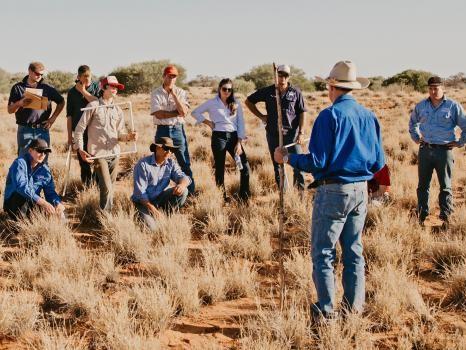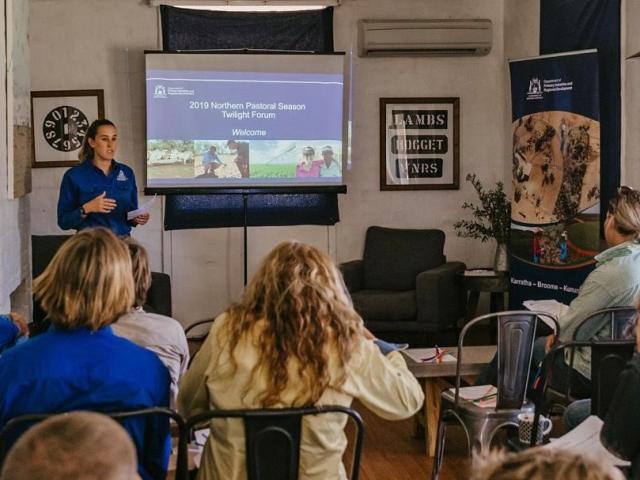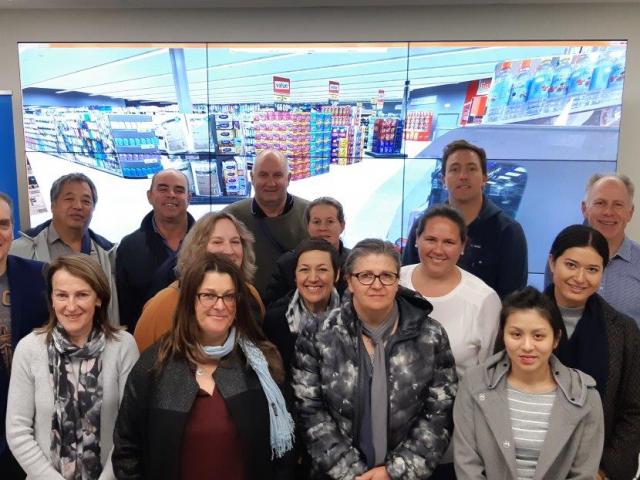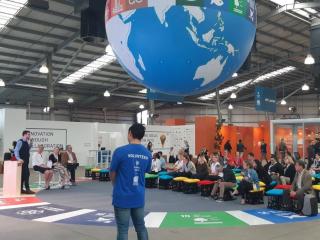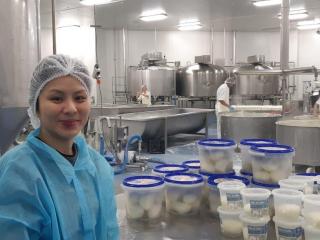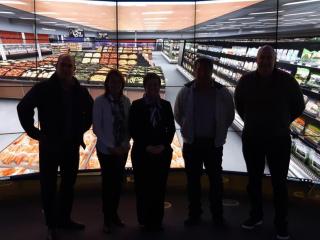Hort research focus on pollination
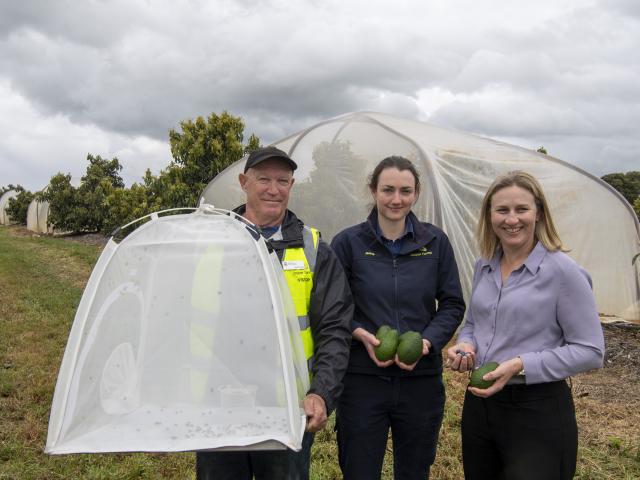
Research trials are currently underway in Western Australia to look at the potential for native flies to pollinate our fruit and vegetable crops.
The field trials form part of a $5.7 million national research effort focused on the use of flies to pollinate horticultural crops, with major funding support through Hort Innovation and involving some of the nation’s leading researchers.
While bees are the most widely-used and well-known pollinators for crops, a range of insects are natural crop pollinators, in particular flies.
Fly pollination test sites are set up on farms in Western Australia (Busselton and Gingin); Queensland (Mareeba, Dimbulah, Walkamin, Bundaberg); Tasmania (north and south); South Australia (Mt Gambier); and the Northern Territory (Darwin).
The five-year project is being led by the Department of Primary Industries and Regional Development (DPIRD), in collaboration with the University of WA, Western Sydney University, University of New England, Seed Purity Pty Ltd and Biological Services.
Flies make good pollinator candidates because they are present year-round, they require sugar and regularly visit flowers for nectar where pollen readily sticks to their hairy bodies.
Two local fly species have recently been released into netted enclosures on an avocado orchard in the State's South-West to coincide with flowering, to examine the influence of flies on fruit production.
The trial site was recently visited by Agriculture and Food Minister Alannah MacTiernan and Hort Innovation R&D General Manager Dr Alison Anderson.
They met with DPIRD research officer Dr David Cook, farm agronomist Jacinta Foley and UWA researcher Dr Sasha Voss to view this season’s trials.
The trials are in netted enclosures on the property, during the short window of time that avocado are flowering, which extends approximately five weeks.
Several weeks after flowering has ended, a count is made of the number of avocado fruitlets formed that are more than 5 mm in diameter (a measure of pollination success) across different treatments, including a comparison with bee pollination in the open trees close-by.
A second count is made in February and the final harvest of fruit will be assessed in winter 2020.
Pollination is vital to the success of many fruit, nut and vegetable crops, with pollination-dependent crops in Australia worth almost $6 billion per year.
By exploring different pollination methods, this project aims to equip growers with more options for pollination services into the future and to help boost production Australia’s fruit, vegetable and nut production.
This is a collaborative approach by department researchers, the horticulture industry, universities and the private sector to share their knowledge and work together on innovative ways to benefit our fruit and vegetable industries.
The research team has extensive entomological experience, specifically in the field of insect pollination of crops and vegetable seed production, fly species and their rearing methods.
For more information contact Dr David Cook, researcher officer, South Perth on +61 (0) 8 9368 3084
Pastoral season update
The Department of Primary Industries and Regional Development is continuing to work with the State’s pastoral industry to manage the prolonged dry seasonal conditions and prevent impacts on animal welfare.
Officers have visited more than 100 properties since July, with a focus on animal welfare considerations and management.
While the majority of pastoralists are managing these difficult conditions, the department has been working with a small number of properties around livestock management measures, including steps to improve water provision.
Officers will continue to liaise with pastoralists over the coming months to provide advice and support where needed and ensure impacts are appropriately managed.
The 2019 pastoral season webpage provides useful material to support producers, including climate information, livestock management information and tools, and links to available support services and assistance.
Cattle movements
Industry has responded to the challenging season, installing increased water infrastructure; providing for a variety of agistment arrangements to optimise available feed and water for livestock; and implementing dry season herd management plans.
For the north, there have been significant increases in year to date export and processing figures, which reflect proactive and early decision making. Year to date cattle turn off figures for the region (as of end of August) showed an overall increase in turn off of more than 50,000 head compared to the same time last year.
Animal welfare
People in charge of animals have a legal obligation to provide those animals with proper and sufficient food and water. Responsibilities under the Animal Welfare Act 2002, information to help make welfare decisions for cattle and sheep, as well as the relevant Codes of Practice, are available from the DPIRD website.
Agistment
The Pastoral Lands Board (PLB) has authorised the Department of Planning, Lands and Heritage to approve applications on its behalf, to allow the early movement of drought-affected stock between properties.
This means approval can be granted at any time, rather than pastoralists having to wait for approval at PLB meetings, which are held every two months.
Applicants need to meet certain criteria including that the duration of the agistment does not exceed two years. Pastoralists who would like to apply should email plb@plb.wa.gov.au.
Twilight forums
To further assist producers with access to timely and relevant information, DPIRD’s Northern Beef Development team recently hosted a series of on-station workshops under the theme of ‘Managing for climate variability’.
Three October workshops at Bidgemia Station, Gascoyne Junction; Emu Creek Station, Nanuturra; and Ethel Creek Station, Newman, were attended by 52 people from 15 pastoral companies. They followed three successful forums held in April near Marble Bar, Derby and Halls Creek.
The forums featured Grey Mackay from Kimberley Pilbara Cattlemen’s Association, explaining the key drivers of seasonal climate in the north west and consultant Col Paton discussed management strategies such as forage budgeting and implementing key decision dates to manage pasture and cattle in drier years.
Phil Tickle from Cibo Labs presented on how satellite technology can assist pastoralists in monitoring the pasture availability for their cattle as well as monitor land condition.
Owen Catto from the Regional Men’s Health Initiative presented to attendees and DPIRD officer James Matthews discussed animal welfare in difficult seasons.
For more information contact Dr Bruce Mullan, director, Livestock Research and Industry Innovation on +61 (0)8 9368 3578
Resources updated to assist landholders with dry seasonal conditions
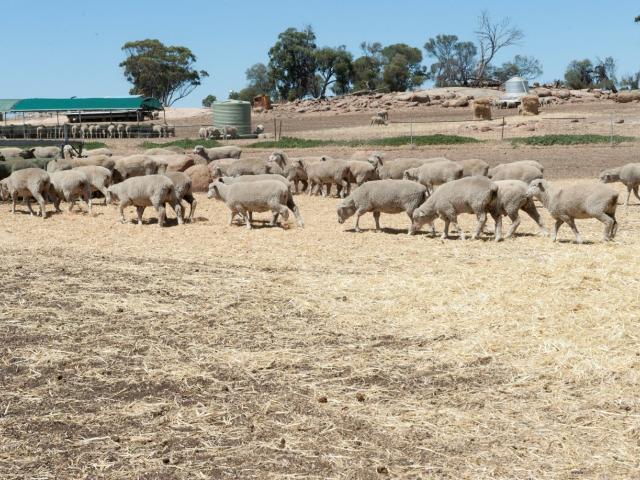
The Season 2019 webpage includes an article Harvesting patchy, short crops with a host of tips and options to achieve a quick, clean, low cut that could make a difference to crop profitability.
There is also an article on Harvesting a frosted crop, which features discussions and considerations for this season and the next when taking off cereal or canola crops that could be damaged by frost.
As the season progresses the risk of wind and water erosion could become a challenge for landholders managing competing needs for paddock coverage and livestock feed.
The Managing wind erosion article guides landholders though stubble and pasture management options to achieve the 50 per cent ground cover required, regardless of soil type, to provide protection from wind and water erosion through to the start of new season growth.
Weather and climate forecast
Local and international models showing a preference for below normal rainfall for the lower west and south west of the State for the next three months.
The department’s Statistical Seasonal Forecasting system and the Bureau of Meteorology’s outlook for October to December is for drier than normal conditions, coupled with above average temperatures for much of southern WA.
The department’s comprehensive weather pages have recently been enhanced, including data from the Bureau of Meteorology’s 91 automatic weather stations, noting daily minimum temperatures and enhancing the map colours to make rainfall and temperature observations easier to read.
Water supplies
The department continues to support the Department of Water and Environmental Regulation (DWER), the Water Corporation and local governments to monitor farm water supplies, particularly in south eastern shires.
DWER’s online Dry Season Survey for Livestock Water Supply remains open to collect information and identify where there may be potential issues requiring a coordinated response across government.
Water deficiency declarations are currently in place in the districts of Hollands Rock, Mount Short and Mallee Hill to enable government water carting to provide supplies for livestock purposes.
Landholders planning to invest in new water infrastructure to address animal welfare needs or build drought resilience may be eligible for a rebate for 25 per cent to a maximum of $25,000 from the Commonwealth’s National On-Farm Emergency Water Infrastructure Rebate Scheme.
Rebates can be applied to costs incurred after 30 June 2018, and applications close 30 April 2021 or when the funding allocation is exhausted, whichever occurs first.
DWER’s Farm Water Supply Planning Scheme also provides rebates of up to $1000 for commercial broadacre farmers experiencing water shortages to fund an audit of farm water supply and potential improvements.
Support services
As harvest progresses and the year comes to a close the impact of the 2019 season on landholders financial situation will become more apparent.
While there has been much attention on the drought in the eastern states, assistance is also available to WA landholders affected by – in some cases – consecutive seasons of below average rainfall.
The Season 2019 webpage has a range of information including available health and financial assistance.
It includes links to the Farm Hub website, which has information on Drought Loans and Farm Investment Loans, as well as the Farm Household Allowance for families experiencing financial hardship.
Check out the Support Services article in this edition of AgMemo for more detailed information on financial and social assistance.
Stay up to date with the latest seasonal information and advice by revisiting the Season 2019 webpage in the months ahead or contact one of our local offices to access more information.
For more information contact Brendan Nicholas, Esperance manager, Esperance on +61 (0)8 9083 1110.
Support services available to assist primary producers affected by dry seasonal conditions
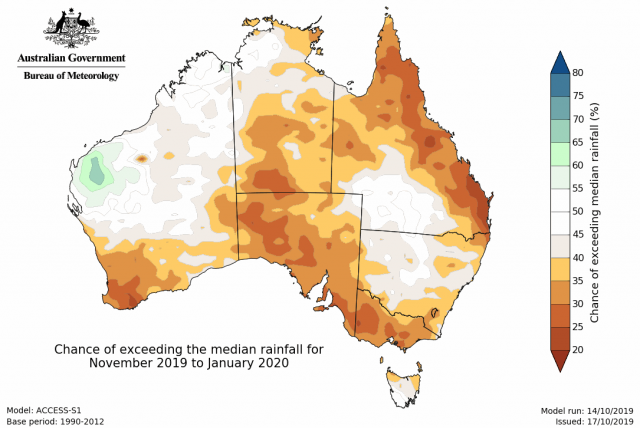
2019 has been a difficult season for many throughout Western Australia with variable rainfall impacting on production and profitability.
A range of Federal and State assistance measures are in place (see below) to support farmers and pastoralists experiencing hardship, as a result of seasonal pressures.
Western Australia does not have a drought declaration system so no formal declaration needs to be made to access these services.
The Federal Government’s National Drought Policy aims to build resilience to climate variability and dry season pressures, specifically through bolstering risk management practices and enhancing long-term preparedness.
| Support service directory | ||
| Financial support | ||
| A website that harnesses information about Commonwealth and State/Territory assistance (includes Drought Loans, Farm Investment Loans, Farm Household Allowance) |
| |
| Assists farming families experiencing financial hardship with income to maintain their household | 13 23 16 or 1800 612 004
| |
|
| Low interest loans for businesses to improve the strength, resilience and profitability of their businesses (provided by the Regional Investment Corporation) | 1800 875 675
|
| Free financial counselling service to assist primary producers | 1800 612 044 | |
| Assists farm and pastoral businesses and financial institutions to resolve disputes about business financial arrangements, through a low cost and non-legal form of mediation | 1800 198 231 | |
| Income support programs for farmers and rural small businesses | 13 23 16
| |
|
| Funds for household expenses | 9321 6041 info@cwaofwa.asn.au |
| Water Support | ||
| National On-farm Emergency Water Infrastructure Rebate Scheme | Rebates of 25% up to a maximum of $25,000 for the purchase and installation of new water infrastructure and equipment to eligible commercial livestock farmers and pastoralists | 1800 780 300 |
| Grants of up to $100,000 available for community water supply development and improvements in dryland agricultural areas receiving <600mm average annual rainfall | 1800 780 300 | |
| Network of strategic community water supplies in WA dryland agricultural areas to provide emergency stock water | 1800 780 300 | |
| Emergency water for livestock provided by the State government carted to a central point, coordinated via local shires | 1800 780 300 | |
| Rebates of up to $1000 for commercial broadacre farmers experiencing water shortages to fund an audit of farm water supply and potential improvements | 1800 780 300 | |
| Wellbeing | ||
| 24 hour crisis support, suicide prevention and mental health support services | 13 11 14 | |
| Counselling for individuals, couples and families experiencing challenges to help them cope, improve wellbeing and identify options | Click here for local counselling services
| |
| Provides support and education services to regional men, communities and health services | 9690 2277 (office hours) | |
| Provides information and referrals regarding health, finances, legal matters, counselling and domestic crisis | 1800 199 174 | |
| Other information | ||
| Western Australia’s rural health, financial & information services support directory | Contacts for a range of 24 hour support, financial and family counselling, health, emergency and ancillary services |
|
If you cannot find the assistance or support you require please contact your local DPIRD office or call (08) 9368 3334 or email enquiries@dpird.wa.gov.au
For more information contact Christine Thompson, senior policy officer, Katanning on +61 (0)8 9821 3223.
It's not too late to take part in Biosecurity Blitz!
Would you like to help protect your agricultural industries and your environment from harm caused by damaging pests?
It's not too late to join in the Biosecurity Blitz! The month long event, managed by the Department of Primary Industries and Regional Development (DPIRD), ends on 16 November. It is about encouraging industry and communities across Australia to get outdoors to look for pests, weeds and diseases.
The goal is to look for, photograph and report as many organisms as possible. So get out in the field, take a wander through your town, search around your home and start blitzing!
The Biosecurity Blitz provides an opportunity for DPIRD to increase the number of ‘eyes on the ground,’ expand its surveillance efforts, and help our industries by verifying whether or not we have certain unwanted pests in WA.
Verifying Australia’s freedom from exotic pests helps maintain Australia’s ability to continue trading and grow access to future markets.
This is the fifth year DPIRD has put out the call to look and send in reports. To participate all you need to do is:
- follow the link and sign up
- download one of our free reporting apps, which include the free MyPestGuideTM Reporter or PestFax apps, as well as the WA PestWatch app for aquatic observations.
DPIRD experts will identify the organisms reported and map the data online for the reporting community to view.
Last year’s Biosecurity Blitz resulted in more than 1600 reports – the most common being beetles, bugs and butterflies. The majority of pest reports came from metropolitan areas.
The challenge this year is to increase the number of reports from regional areas, and increase the scope of what is reported. Remember - pests are not just insects! They also include feral animals, weeds, diseases and interesting sightings in aquatic environments, such as organisms found in the ocean, lakes, rivers and even mud puddles!
For those who want to dive a bit deeper and get stuck into some serious biosecurity surveillance, there are a number of pests the public can be extra vigilant about this year. These include ants, such as Browsing ant which is not normally found in WA, Citrus gall wasp, Brown marmorated stink bug, European wasp, dung beetles, liver fluke, European house borer, Tomato potato psyllid and aphids.
So, for anyone interested in hands-on activities, activity sheets are available from the department’s website, which include instructions on how to use MyPestGuide™ Reporter, make pest traps, hunt for snails, or ‘bait and wait’ for wasps.
In addition, the ‘School Challenge’ is on, which is a special feature of the annual Biosecurity Blitz. This competition awards schools for the largest number of participating students, the most reports made within their postal code area, and the level of engagement with other schools and the community.
For more information go to the Biosecurity Blitz 2019 webpage, call the Pest and Disease Information Service +61 (8) 9368 3080 or email padis@dpird.wa.gov.au. For technical reporting queries email mypestguide@dpird.wa.gov.au
New measures in place to control stable fly

An updated management plan to control stable fly is now in place, incorporating improved management methods to minimise and control breeding of the livestock pest.
Stable fly (Stomoxys calcitrans) is an aggravating pest in Western Australia, particularly on the coastal plain, north and south of Perth. It can bite humans, domestic pets and livestock, seeking to draw blood which is essential to complete its life cycle. The peak time for stable fly to breed and be active is from October to April.
The Stable Fly Management Plan 2019 sets out measures to control stable fly in areas of Western Australia where it is a declared pest – the cities of Armadale, Cockburn, Joondalup, Kwinana, Rockingham, Swan and Wanneroo; shires of Capel, Chittering, Gingin, Harvey, Kalamunda, Serpentine-Jarrahdale and Murray.
It is not feasible to eradicate stable fly in Western Australia, however, the new control measures under the updated management plan aim to control breeding.
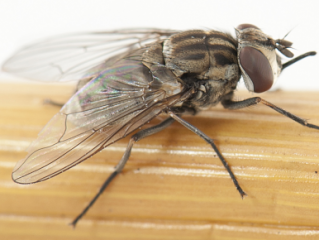
Changes from previous Stable Fly Management Plan 2016
Under the 2019 plan, all areas in the declared shires are subject to the plan, not just agricultural land.
Waste likely to breed stable fly, such as post-harvest vegetable waste, must be buried at least a metre underground.
Waste vegetables fed to stock must be in troughs of boxes or on hardstand; the vegetable waste cannot be placed directly on soil. Fodder (hay and silage) must be spread thinly on paddock or fed on hardstand.
Research by the Department of Primary Industries and Regional Development found that stable fly can be more effectively controlled in commercial vegetable production on sand by rolling or compacting topsoil than with chemical treatment. Vegetable waste can be buried to a depth of 300mm with a stone burier or mouldboard plough, then the soil surface compacted with a roller.
The Stable Fly Management Plan 2019 includes the control measures from the previous plan as approved measures for a period of two years. This will allow for the transitioning to the updated measures. The approved measures are available on the department’s website.
More information about the stable fly management plan and a link to the gazetted 2019 plan is available at www.agric.wa.gov.au/bam/management-plans
For more information contact Tory Weir, senior policy officer, Invasive Species and Biosecurity, South Perth on +61 (0)8 9368 3428
Study tour to Victoria proves invaluable to WA food and beverage businesses
Networking, relationship building, access to knowledge, conference participation, and the chance to visit leading Victorian food manufacturing facilities were highlights of the Department of Primary Industry and Regional Development’s first Food Industry Innovation interstate study tour in September, 2019.
Thirteen food and beverage businesses from Western Australia were selected for the tour, for was partially subsidised by DPIRD.
The itinerary included food and beverage manufacturing site visits, and was centred around the inaugural Global Table Conference, which attracted more than 2700 delegates from 25 countries, including 200 speakers at 50 sessions, held over four days.
The first stop was Parwan Valley Mushrooms, where participants were taken through the growing process and given insights into planning and decision making processes by the successful business.
The tour group continued to Ballarat, where a facilitated sprint design workshop allowed for networking, and critical and innovative thinking with City of Ballarat food and beverage businesses.
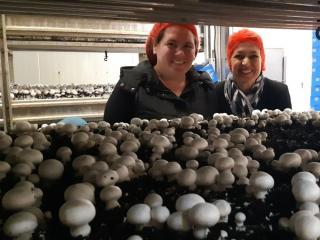
Participants spent day two attending Feeding our Future, the inaugural Australian Global Table conference hosted by the Victorian government, and presenting at The Global Food Innovation Summit organised by Seeds&Chips, which focused on climate change, food waste, and sustainability.
At the conference dinner, participants met WA’s Luke de Laeter of Luke's Bees, who funded his Global Table trip with the proceeds of the business he operates one day a week on special leave from high school. Luke is passionate about community education abound beekeeping and the importance of bees. He valued making connections with WA honey bee industry members who were on the tour.

Day three for the group involved a tour of Costco’s Docklands warehouse, which proved eye opening for participants as they each considered the required scale for their business to become a major supplier.
Costco is the third largest retailer, globally, and has 772 warehouses worldwide, including 11 in Australia. The first store in Western Australia is due to open at Perth Airport in early 2020, and a second is scheduled for Kwinana later next year.
Although everything at the warehouse was large (including the trolleys), Costco ensures all stocked products are high quality.
The afternoon was spent at the Global Table conference, with more panel discussions, and exploration of the innovation and trade exhibitions.
Austrade prepared a comprehensive presentation for the WA delegation, which had the rare opportunity to hear from Trade Commissioners to China, Japan, India and South East Asia.
Site visits to two dairy manufacturers on day four allowed tour participants to talk to marketing staff and managers, and gain insights into strategies that have worked for the businesses.
Access to the production floor, and seeing two contrasting production systems, were highlights. That’s Amore Cheese produces more than 40 types of stretch mozzarella-style cheese, many of them labour intensive, hence the business name and motto, ‘the key is love’.
Chobani, which landed in Australia in 2012, became the top yoghurt brand in five years, producing yoghurt 24 hours a day, 7 days a week in an almost completely automated factory.
The tour wrapped up on day five, with participants visiting two of Australia's leading Food Innovation Centres: Monash University and CSIRO.
Monash University began its Food Incubator program in 2018, allowing businesses to access its in-house recipe development assistance, prototype development (including 3D printing), label design and consumer testing, making food business journeys to commercialisation less risky. The program enables participants to test their consumer research, which provides a good foundation when pitching to retailers.
The group was particularly impressed with the Cave, a virtual supermarket and eye tracking heat mapping tool, which shows hot and cold spots on the shelf – a technology that can also be applied to product labels.
CSIRO's Food Innovation Centre in Werribee focuses on food technology and consumer taste-testing, among many other areas of research and development.
At the centre, businesses can make use of various commercial scale food processing machines, all of which can be easily moved and connected in sequence, as required. From testing the scale-up of new recipes to improving process efficiency, the centre is versatile with knowledgeable staff.
Feedback collected from the tour showed participants found it invaluable, and plan on making changes to their businesses as a result of what they have leaned. Participants also built new friendships, and gained mentoring and collaboration opportunities with their peers from Western Australia.
For more information contact Amelia de Groot, project officer, Agribusiness, Food and Trade, South Perth on +61 (0)8 9368 3474
Thai and Japanese buyers sample WA’s finest produce
DPIRD is taking an active role in helping facilitate and develop export opportunities and commercial relationships for WA agribusiness.
The department regularly hosts trade delegations to connect our export-ready agrifood and beverage producers with international buyers, enabling them to develop business networks and build relationships.
Recently, the Primary Industry Trade team hosted buyers from Thailand’s CP Merchandising and Japan’s Itochu Corporation to sample quality produce from across the South West and Perth metropolitan area.
We also matched several export-ready seafood producers with the buyers as they were highly interested in WA seafood.
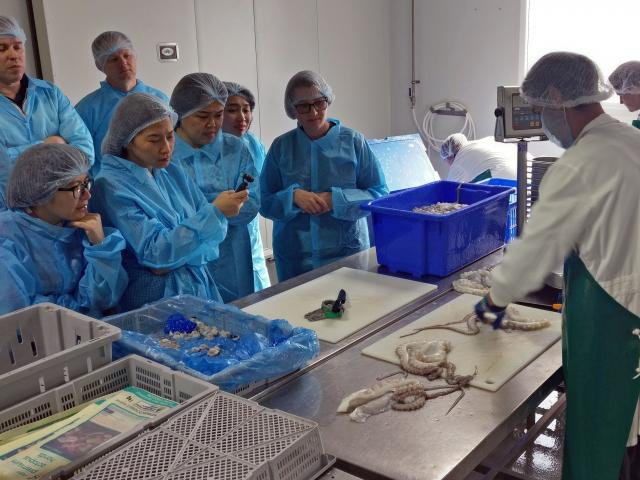
Agriculture and Food Minister Alannah MacTiernan helped showcase WA, officiating at a long table dinner at Lamont’s Bishops House in Perth. The dinner featured product of interest to the buyers from six WA businesses including avocados, carrots, lamb, seafood and citrus.
The Inbound Buyer Missions have proven to be very successful at building connections. Delegations of buyers from Singapore, Malaysia, Thailand and Vietnam were coordinated earlier this year in April to visit export-ready food and beverage businesses across southern regions.
Since then, the department has helped facilitate the progression and/or commencement of commercial arrangements to supply red meat, dairy, seafood, horticulture and other premium foods with the buyers.
There are great opportunities for agrifood exports into Asia. The Target Market Opportunities reports on the department’s website identify 20 high growth, high value premium opportunities at the intersection between what Asian consumers want and what WA can produce.
For more information contact Joan Lim, Manager, Asian Market Success, South Perth on +61 (0)8 9368 3277
Djarindjin Airport wins Economic Development Award

Djarindjin Airport has won the 2019 Department of Primary Industries and Regional Development Economic Development Award at the recent Regional Achievement and Community Awards.
The Department of Primary Industries and Regional Development Economic Development Award recognises those in regional communities working to maximise job creation and improve career opportunities.
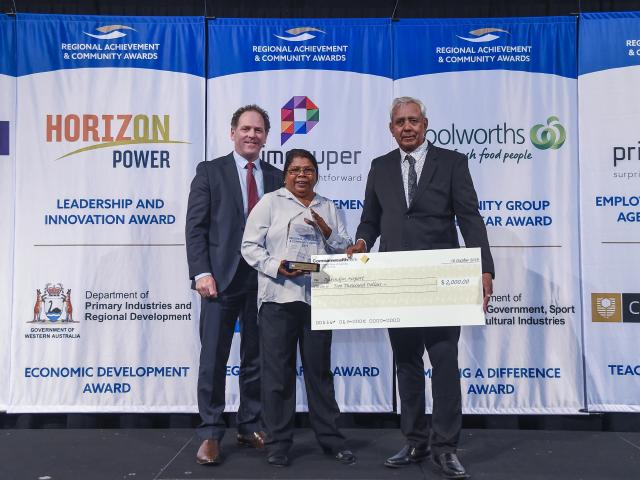
Located near the top of Dampier Peninsular, the airport is exclusively owned by Djarindjin Aboriginal Corporation who have successfully operated the airport for the last eight years. The airport provides hot fueling for passenger transfer helicopters flying to Browse Oil and Gas base from Broome, a service that allows the refueling of a helicopter with its engine running or its rotors rotating for the aircraft to promptly return to the air.
After borrowing $6 million to develop the airfield, Djarindjin Airport had the debt repaid within six years and today, the airport invests back into its community by providing 20 high-quality jobs that provide significant incomes for the community.
The airport also assists its community by supporting local youth services and engagement programs, night patrol, women’s art center and small business enterprise. The profits are also supporting the infrastructure needs including non-gazetted roads, street lighting, and waste and water management.

